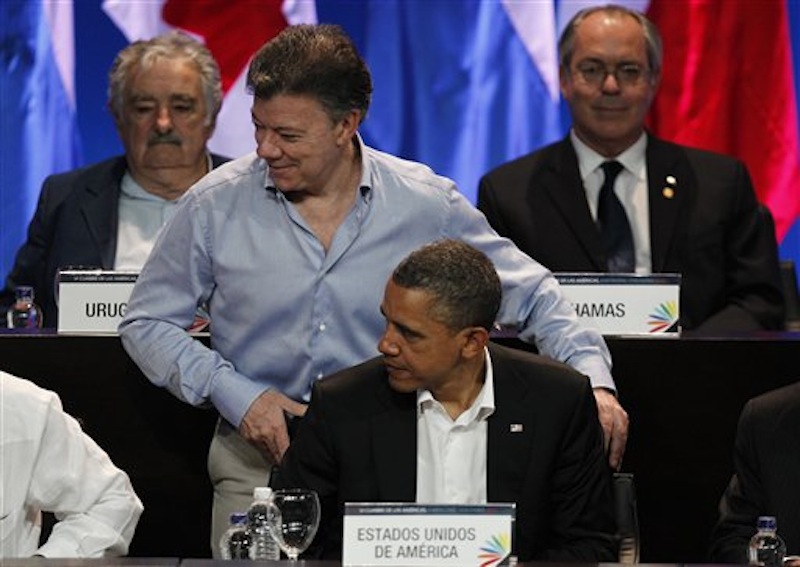CARTAGENA, Colombia — A summit of 33 Western Hemisphere leader opened Saturday with the United States and Canada standing firm, but alone, against everyone else’s insistence that Cuba join future summits.
Colombian President Juan Manuel Santos, a U.S. ally, opened the summit with a criticism of Cuba’s exclusion, calling it an unjustified anachronism of the Cold War.
He also urged a reconsideration of the war on narcotics that he said began a century ago, referring obliquely to growing suggestions that the hemisphere’s nations consider ending a prohibition of many drugs that has fed violence and crime.
The Sixth Summit of the Americas has also taken on a tabloid tinge with 12 U.S. Secret Service agents sent home for alleged misconduct that apparently included prostitutes and days of heavy pre-summit poolside drinking.
U.S. President Barack Obama has been clinging to a rejection of Cuban participation in the summits, which everyone but Canada deems unjust.
“This is the last Summit of the Americas,” Bolivia’s foreign minister, David Choquehuanca, told The Associated Press, “unless Cuba is allowed to take part.”
The fate of the summit’s final declaration has been thrown into uncertainty as the foreign ministers of Venezuela, Argentina and Uruguay said Friday their presidents wouldn’t sign it unless the U.S. and Canada removed their veto of future Cuban participation.
Vigorous discussion is also expected on drug legalization, which the Obama administration opposes. And Obama will be in the minority in his opposition to Argentina’s claim to the British-controlled Falkland Islands.
The charismatic Obama may be able to charm the region’s leaders as he did in 2009 with a pledge of being an “equal partner,” but he will also have to prove the U.S. truly values their friendship and a stake in their growth.
“The United States should realize that its long-term strategic interests are not in Afghanistan or in Pakistan but in Latin America,” Santos said in a speech to business leaders at a parallel CEO summit on Friday.
In large part, declining U.S. influence comes down to waning economic clout, as China gains on the U.S. as a top trading partner. It has surpassed the U.S. in trade with Brazil, Chile, and Peru and is a close second in Argentina and Colombia.
“Most countries of the region view the United States as less and less relevant to their needs — and with declining capacity to propose and carry out strategies to deal with the issues that most concern them,” the Washington-based think tank the Inter-American Dialogue noted in a pre-summit report.
Stereotypes of ugly Americans were, unfortunately, reinforced on summit eve with misconduct allegations
A caller who alerted The Associated Press to the case said the misconduct involved prostitutes.
A Secret Service spokesman did not dispute that. Nor did the U.S. official who, speaking on condition of anonymity because of the matter’s sensitivity, put the number of agents sent home at 12. The agency was not releasing the number of personnel involved.
One employee of the hotel where the agents stayed, the beachfront Caribe, said the agents drank large quantities of alcohol at the poolside daily for about a week before being dressed down by a supervisor and sent home Thursday. The employee spoke on condition of anonymity because he feared for his job.
Obama faced challenges enough at the summit without that distraction.
Cuba was proving the biggest.
Ecuadorean President Rafael Correa was boycotting the summit over Cuba’s exclusion, while moderates such as Santos and President Dilma Rousseff of Brazil said there should be no more America’s summits without the communist island.
Obama’s administration has greatly eased family travel and remittances to Cuba, but has not dropped the half-century U.S. embargo against the island, nor moved to let it back into the Organization of American States, under whose auspices the summit is organized.
Another big issue will be drug legalization, which the Obama administration firmly opposes. Santos left it off the official agenda but has said all possible scenarios should be explored and the United Nations should consider them.
Meeting with Argentine President Cristina Fernandez at his request, Obama can expect to discuss that country’s claim to the Falkland Islands, known as the Malvinas by the Argentines, after Argentina lost a war with Britain 30 years ago while trying to seize them.
Among the hemisphere’s leaders, there is nearly unanimous support for Argentina’s position.
One potentially prickly confrontation for Obama was averted Saturday when Venezuela’s foreign minister announced that President Hugo Chavez would skip the summit. The minister, Nicolas Maduro, said Chavez took the decision because of a medical recommendation.
Chavez was heading instead to Cuba to continue treatments for cancer. He had dominated past summits with his trademark fiery speeches.
Send questions/comments to the editors.



Success. Please wait for the page to reload. If the page does not reload within 5 seconds, please refresh the page.
Enter your email and password to access comments.
Hi, to comment on stories you must . This profile is in addition to your subscription and website login.
Already have a commenting profile? .
Invalid username/password.
Please check your email to confirm and complete your registration.
Only subscribers are eligible to post comments. Please subscribe or login first for digital access. Here’s why.
Use the form below to reset your password. When you've submitted your account email, we will send an email with a reset code.